Remembering the Rebel, Underground Movie Theater That Gave Hope to Wartime Sarajevo: ‘The Spirit of Cinema Would Keep Us Alive’
- Oops!Something went wrong.Please try again later.
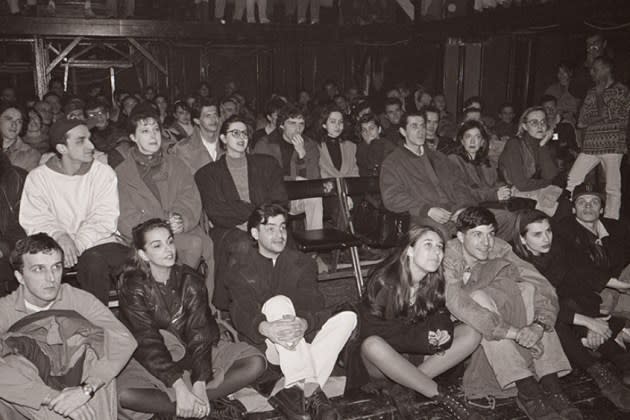
To step inside Sarajevo’s Apollo Cinema 30 years ago, you first had to find the door.
The streets of the Bosnian capital were pitch black. Power cuts brought on by a crippling siege, which started in 1992 when Bosnian Serb forces surrounded the city, left the town plunged in darkness. Residents fortunate enough to own gasoline-powered generators were reluctant to use them, for fear that lights would attract sniper fire. Shelling left giant holes in the streets and pavement. The locals referred to them as “rosebuds.”
More from Variety
Sarajevo Film Festival to Mark 'Day of Mourning' Following Murders in Bosnia
'Vagabondess' Director Brigitta Kanyaro Explores Differing Views on Feminism, Motherhood, Migration
The Apollo was housed in the basement of the Sarajevo Academy of Performing Arts, where the Obala Art Center — a group that had risen to prominence in the 1980s — mounted acclaimed stage productions that traveled around the world. Visitors entered through a hole in the wall ringing the perimeter of the academy, crossed a small courtyard to the building’s back door and descended a steep flight of stairs. As their eyes adjusted to the darkness, a faint light glowed in the distance.
“To go into the Obala war cinema, where there was light from a generator, felt like stepping into a concrete, underground Oz,” recalls Scottish filmmaker and historian Mark Cousins (“The Story of Film”), who receives an Honorary Heart of Sarajevo Award this week at the Sarajevo Film Festival.
Cousins was then programmer of the Edinburgh Film Festival and was part of a cultural delegation that had been invited to Bosnia. “I grew up in Belfast in the 1970s, and during our war, cinema had been a lifeline for me, a window open onto other, better worlds,” he says. “War is a monotone. Films are multi-tonal. Also, I’d just made a film about neo-Nazis (‘Another Journey by Train’), so the fact that you have to stand up to bullies was very much in my blood.”
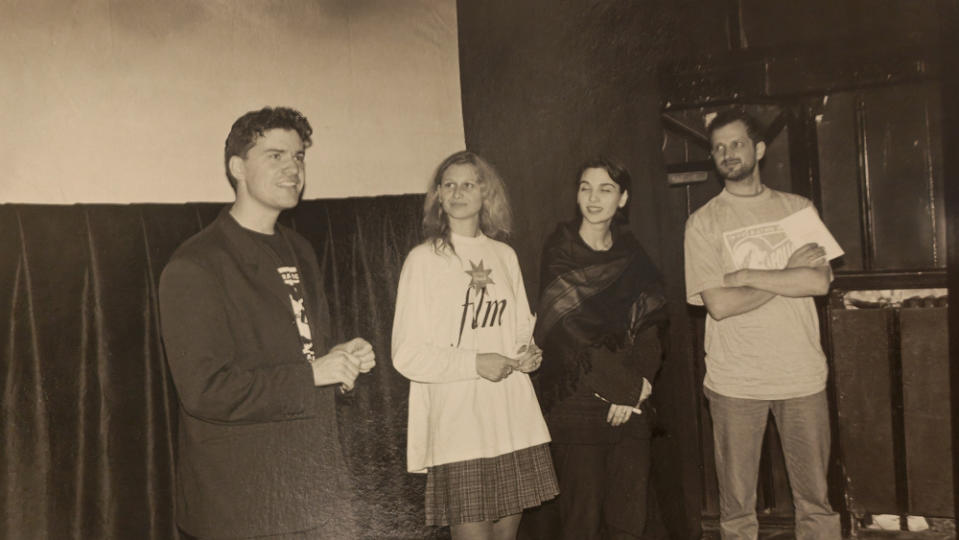
The director had arrived in Sarajevo aboard a military plane from Zagreb and then crossed the city in an armored personnel carrier. The effect of wartime shortages was apparent; he recalls, “to my shame, that when I realized how little food there was. I kept some of the cheese I brought to nibble in the dark, on my mattress at bedtime.”
He remembers the Apollo as a scrappy, bootstrap effort. “Everyone smoked. The audience of 120 was the most mixed I’ve ever seen — lots of local people, young activists, military, aid workers, an ambassador or two,” he says. “People were so thin. The chairs were hard and packed together.”
Yet despite the rationing, despite the blockade, despite the sniper fire and the steady bombardment of artillery shells raining down on the city, Cousins arrived to a full house: Bosnians who had put their lives at risk with something somehow more precious than survival at stake.
“Film festivals, with their red carpets and elitist ticketing, can sometimes seem a bit purposeless,” the director says. “The war cinema Apollo was crystal clear, diamond hard in its purpose: To defibrillate. To keep Sarajevo alive.”
On opening night, Cousins recalls, before a screening of Ken Loach’s “Ladybird Ladybird,” he delivered an impassioned speech to the audience. “Travelling here felt like crossing the universe,” he said. “We are here to salute your defiance of aggression and to support your values of tolerance and multiculturalism.” He added: “The Apollo isn’t the grandest movie house I’ve even seen, but because of what it stands for, I think it is the most beautiful in the world.”
“You are not alone”
When Bosnia and Herzegovina declared independence from Yugoslavia following a March 1992 referendum, Bosnian Serb forces encircled the capital of Sarajevo, stationing upwards of 13,000 troops in the surrounding hills and battering the city with a relentless bombardment of tank and artillery fire. Bosnia’s ill-equipped defense forces were completely outmatched. On May 2, the Bosnian Serbs began a punishing blockade of the city. Sarajevo was cut off from the rest of the world.
As the fighting intensified, many of the Obala Art Center’s members left the city, while others saw their apartment buildings destroyed by shelling. Obala founder and longtime Sarajevo Film Festival director Mirsad Purivatra was among those who stayed behind and moved into the basement of the Academy of Performing Arts, where an impromptu commune took root, hoping to wait out the war.
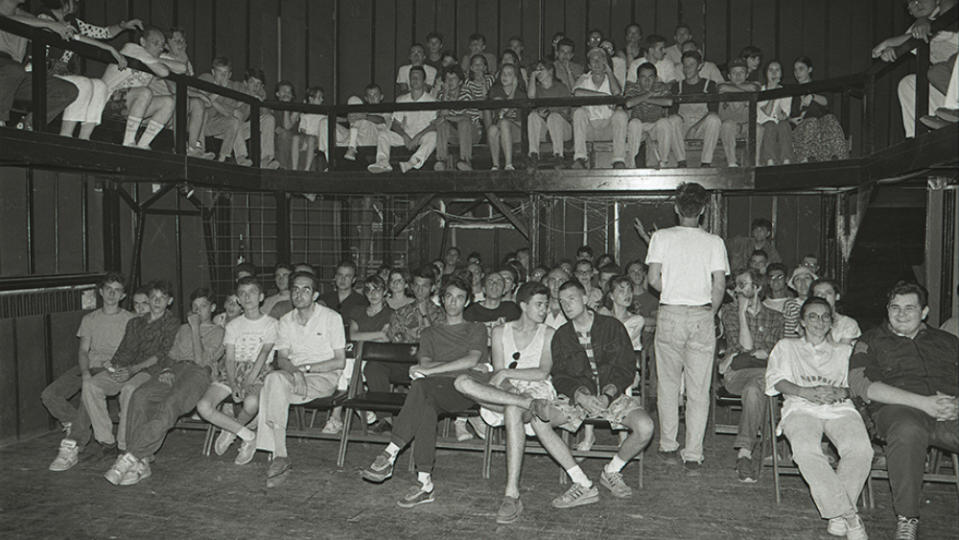
Purivatra recalls nerves fraying after “several months with no electricity, with no water, with no food, with no gas.” Artillery battered the city day and night; those who left the safety of the basement to search for supplies risked being picked off by Serbian snipers. But the steady, day-to-day attrition of the siege was also taking a heavy psychological toll.
“Even with the bombing, with the snipers, living in the cellar, we were saying: ‘Maybe we can survive physically, but how do we survive mentally?’” says Purivatra. “We found that the human being is based on a necessity also for culture, for art, for other things — not only with food and heating.”
The group tapped into its international network and soon organized art exhibitions by the likes of British sculptor Anthony Gormley, French sculptor Christian Boltanski and American photographer Annie Leibovitz, who made the dangerous journey across wartime Sarajevo to visit the center. “They came to the besieged city bringing such important energy to us to say, ‘You are not alone,’” Purivatra says, adding that their visits brought “a new value to the life of the people who were abandoned by the rest of the world.”
Inspired by their support, the Obala Art Center team began to consider a bigger, bolder gambit, something Purivatra describes as a “mission impossible”: “Let’s create, again, cinema [in Sarajevo].”
A bridge to the outside world
Throughout the siege, Purivatra and his colleagues were in contact with foreign journalists stationed in the city, who brought them updates from the world beyond the siege. With their help, the Obala reached out to representatives of the United Nations, which maintained a nearly 40,000-strong peacekeeping force in Bosnia and Croatia during the Yugoslav Wars of the early-’90s.
One day, U.N. peacekeepers arrived on the academy’s doorstep with a generator and gasoline. It was a lifeline for the Obala’s war-weary inhabitants. They dusted off a small video projector and raided the academy’s library of VHS cassettes. For the first time since the start of the war, the group was transfixed by flickering images on a screen.
“The first reactions were amazing,” says Purivatra, remembering how the audience was able, however briefly, “to move out of the daily terror, of the daily tragedies, fear.” A powerful awareness was born in him that night: “This spirit of the cinema was something that would keep us alive.”
News of the underground cinema spread quickly, by word-of-mouth. There were no posters or billboards in the shellshocked city to advertise coming attractions; even radio, which was a crucial source of information for the city’s inhabitants throughout the near four-year siege, was considered too risky — like putting a bull’s eye on moviegoers’ backs. From the war’s outset, Serbian forces had targeted Bosnian cultural institutions, such as Sarajevo’s beloved National Library, housed in an elegant Moorish building on the banks of the Miljacka River in the city’s old Turkish quarter, which was burned to the ground in August 1992 along with some two million books, including irreplaceable manuscripts from the Ottoman and Austro-Hungarian eras.
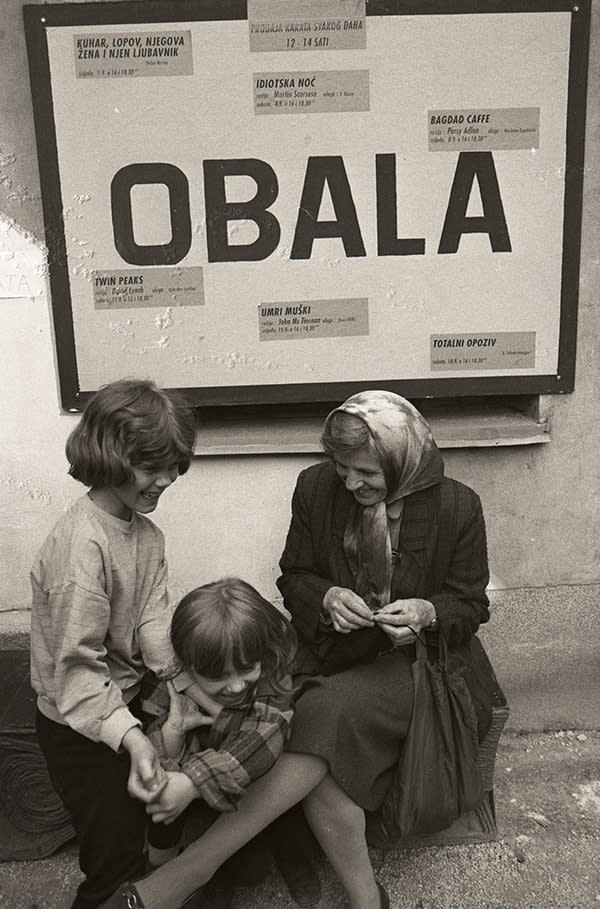
Because snipers targeted the performing arts academy’s front entrance, a hole was knocked into the rear wall. Admission to the Apollo Cinema was free, although the organizers eventually began to charge a token fee of a single cigarette — initiated, says Purivatra, on behalf of one of the theater’s technicians, a heavy smoker who couldn’t satisfy his habit because of the Serbian blockade. Bosnian soldiers would regularly supply the group with cartons that had been smuggled into the city; UN peacekeepers brought gasoline to keep the lights and projector running.
At the outset, the cinema showed just a single film a week, but demand quickly rose for additional screenings from residents starved not only for culture, but for reminders of what life was like before the war. Before long, the Apollo was hosting a nightly screening followed by a rousing debate that would be cut short only because a curfew had been imposed on residents.
The cinema had many champions beyond the war-torn city. Among them was “Field of Dreams” director Phil Alden Robinson, who visited Bosnia with a group of writers invited by the United Nations High Commission for Refugees to accompany a relief convoy just months after the war began. Robinson would remain a passionate advocate for the Bosnian war effort throughout the siege; he supplied Purivatra and company with more than 100 VHS tapes from “Field of Dreams” studio Universal. “Basic Instinct,” released by Universal subsidiary Carolco the year the siege began, was a favorite of the Apollo’s audience; Purivatra recalls the sultry thriller playing for 30 days straight, alongside films from Alfred Hitchcock and Luis Buñuel pulled from the academy’s VHS library.
Other titles, which are screening in a special retrospective at the Sarajevo Film Festival this year to commemorate the Apollo war cinema’s 30th anniversary, included David Lynch’s “Wild at Heart,” Dennis Hopper’s “Easy Rider,” Jim Jarmusch’s “Night on Earth” and Ridley Scott’s “Thelma & Louise.” Cousins recalls packing VHS cassettes of Mike Alexander’s Scots Gaelic film “Mairi Mhor,” Toichi Nakata’s “Osaka Story,” Abbas Kiarostami’s “And Life Goes On,” “and various comic shorts to lighten things,” he says.
“I love a bit of escapism, but I knew that in Belfast, and I suspected in Sarajevo, we didn’t only want to see fluffy comedies,” says the director. “In the cinema we wanted to see everything — joy, romance, power, despair, sexuality, imagery, art. So the films that I brought from the Edinburgh Film Fest weren’t just escapist.”
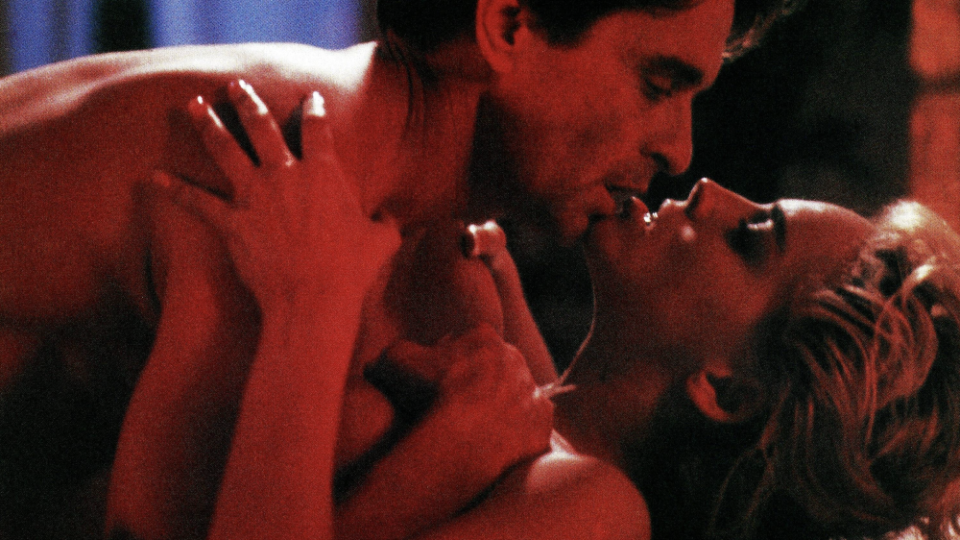
For Purivatra, the international support from the likes of Cousins and Robinson was as important as the films they supplied to culture-starved Sarajevans. “You cannot imagine what kind of positive energy and happiness they brought to this small cellar,” he says. “It was not normal to have someone who is coming from abroad to speak about film, to speak about culture, to speak about what’s going on in the world. Those people changed our lives and brought us hope that we can survive.”
A return to normal life
Marco Müller was the director of the Locarno Film Festival when an Obala rep traveled to Switzerland to appeal to the venerable Swiss fest for support. Moved by the Bosnians’ plight, he agreed to fly to Sarajevo with a selection of films, including all the award winners of that year’s festival.
“We were told we had to fly to Zagreb and wait for instructions,” says Müller, who was traveling with Italian-Armenian filmmaker Yervant Gianikian. They arrived at the Sarajevo airport, which had become a military command center during the war, carrying two backpacks stuffed with VHS tapes.
“[United Nations peacekeeping mission] UNPROFOR were not keen on having cultural diplomats traveling on their military planes,” Müller says, laughing. The duo was unceremoniously kicked out of the airport in the dead of night. “We found ourselves in the middle of nowhere,” he says, stranded at “a snow-covered plaza” miles from the city center. After close to an hour, they managed to flag down a Ukrainian tank, with the former Locarno head explaining to the astonished soldiers in “very poor Russian” that the two filmmakers needed a lift into town.
“Miro [Purivatra] helped plan a big gala evening,” he continues. “It was during the supposed truce period. But the snipers in the hills are still shooting at night. People could not really go out openly in the streets.” In the darkness, Müller, Gianikian and the Ukrainians crawled across the snow-bound city, surrounded by the empty husks of bombed-out apartment blocks.
“In order to reach the theater, you had to go through a system of holes in the wall and underground passages,” he says. “To my big surprise, through this underground network came a crowd all dressed up in gala clothes.” The seats were filled with women in evening gowns and generals in full military attire. “It was quite extraordinary. It was a full house.” Müller remembers an “electric feeling” in the air that night. “To me, all of a sudden, I finally realized why it was so important for Obala, for Miro and his team, to make this festival. It was a sign that normal life could come back.”
A festival beneath the stars
From the first underground screening on a cold, bleak February night in 1993 until the end of the Bosnian War, the Apollo Cinema continued to operate uninterrupted for nearly three years. With the end of hostilities in sight, Purivatra one night sat outside the Academy of Performing Arts with Müller, discussing what would become of the wartime cinema once the fighting ended.
It wasn’t just the electric spirit of those rebellious screenings that the duo hoped to preserve; a generation of emerging Bosnian filmmakers — including eventual Academy Award winner Danis Tanovic (“No Man’s Land”), Oscar nominee Jasmila Žbanić (“Quo Vadis, Aida?”) and Cannes prize winner Aida Begić (“Snow”) — cut their teeth during the war, making powerful shorts about life in Sarajevo during the siege.
“We wanted in some way [to foster the rebirth of] the Bosnian film industry,” says Purivatra. They wanted, too, to create an event that would serve as a bridge between Sarajevo and the rest of the world, just as the Apollo’s nightly screenings functioned as a crucial lifeline for the city’s residents throughout the grinding war.
The first edition of the Sarajevo Film Festival was slated for the summer of 1995, but intense fighting forced the organizers to postpone until the fall. That move was, perhaps, serendipitous: the festival wrapped, almost to the day, with the declaration of a ceasefire that October. Two months later, the opposing sides, joined by U.S. president Bill Clinton, signed the Dayton Agreement, putting an end to the disastrous Bosnian War and ushering in a long process of stabilization in the weary country.
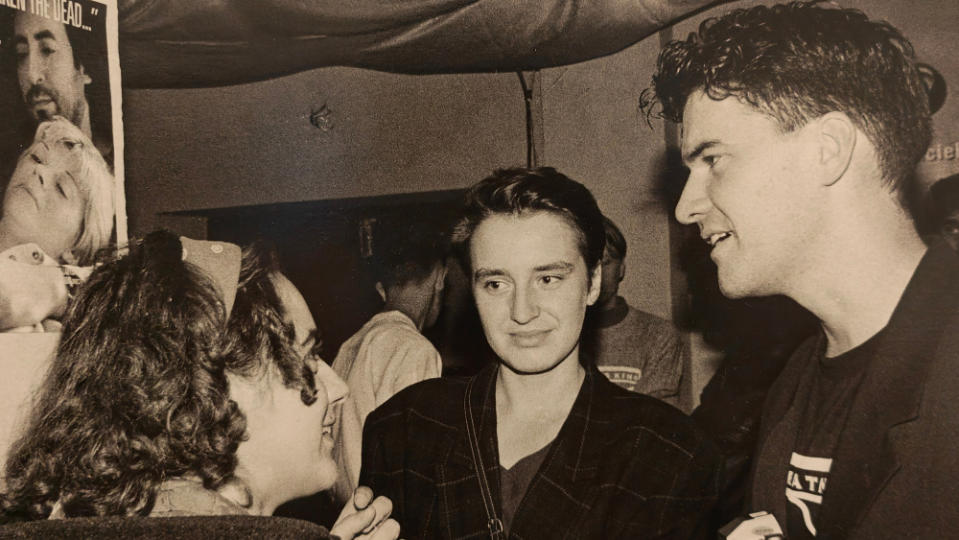
Cousins returns to Sarajevo this week for the first time in 29 years to receive his award. “People who visited Sarajevo for the first time recently say that it’s hard to imagine the siege, the atrocities,” he tells Variety, on the eve of his return. “Will I find that too? I hope not. I don’t want those days to fade. I want them to fuel me all my life.” He continues: “I’ve directed 23 feature-length films, 30 shorts and 40 hours of TV since then. Each has a bit of defiance at its core, the creative defiance I saw in Sarajevo.”
“I’m really proud to say that at least we contributed a little bit to the dignity of the people who decided to stay,” says Purivatra, who stepped down as festival director last year, after nearly three decades at the helm. The seed planted in the basement of the performing arts academy would grow into the most influential film festival in the Balkan region, offering a launching pad for emerging filmmakers and a boisterous setting for audiences and industry professionals to discover up-and-coming talent.
The 29th Sarajevo Film Festival opened Aug. 11 with “Kiss the Future,” director Nenad Čičin-Šain’s documentary, based on a memoir by the American aid worker Bill Carter, about the rock band U2, who used their global platform in the 1990s to raise awareness about the plight of Sarajevo.
The screening, which featured a surprise appearance by U2 frontman Bono and bandmate the Edge, was held in the festival’s Coca-Cola Open-Air Cinema, a packed venue located just a short walk from the Sarajevo Academy of Performing Arts. As the iconic Irish rock star led the rapt crowd on that clear summer night in an a cappella rendition of Bob Marley’s “Redemption Song,” Purivatra marveled at where the Obala Art Center’s long journey had not only taken him, but the festival and the city.
“It was our dream to have people celebrating film and life under the stars,” he says. “For many of us…it’s a beautiful story that really everyone remembers as a heroic time — the time that we did something special.”
The Sarajevo Film Festival runs Aug. 11 – 18.
Best of Variety
Sign up for Variety’s Newsletter. For the latest news, follow us on Facebook, Twitter, and Instagram.

